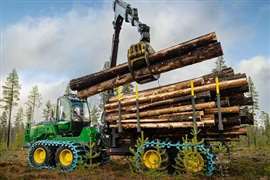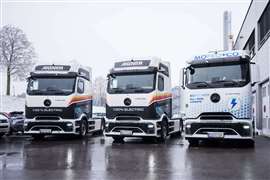Read this article in 中文 Français Deutsch Italiano Português Español
Cummins, partners announce Eclipse CANought as part of Open Telematics initiative
29 September 2024
The new open-source project for commercial vehicle telematics will be launched as part of the Eclipse Software Defined Vehicle project.
Cummins has announced a collaboration on a new open-source project for commercial vehicle telematics. Called Eclipse CANought, Cummins said the project will create industry-specific capabilities focused on standardizing and securing access to the controller area network (CAN) bus, the serial communications network that interconnects vehicle ECUs (Electronic Control Units). This will make it easier to enable features, such as over-the-air software updates.
 Image: metamorworks via Adobe Stock
Image: metamorworks via Adobe Stock
The company is working with Bosch Global Software and software development and integration specialist KPIT Technologies as part of the Eclipse Foundation’s Software Defined Vehicle (SDV) project. The collaboration is a part of the broader Open Telematics initiative announced a year ago to reduce the costs required to develop telematics applications in commercial vehicles.
Application Development Efficiency
The capabilities of Eclipse CANought significantly reduce the time and cost required to develop connectivity applications that access and update vehicle ECUs, Cummins said, simplifying software integration work for OEMs and suppliers. It provides standard and secure access to vehicle ECUs for telematics applications and complements an existing project, Eclipse Kanto.
“Kanto addresses how applications can be run on a telematics device,” said Carlton Bale, director, Digital Product Planning at Cummins. “But the next step is, OK, your application is running, but you need to talk over CAN to your ECU — the Cummins application [or] the software update application needs to talk to the Cummins ECU to perform the software update.”
Bale said variations in CAN libraries and interfaces as well as hardware configurations mean that every device results in a new set of issues to be overcome in communicating with the ECU.
“We saw an opportunity to work with KPIT and Bosch to really come up with a common solution and a very developer-friendly API that separates CAN access from the exact hardware configuration down below it,” he said.
Third-Party Security
This is a two-pronged approach, Bale said. It required creating an easy-to-use API as well as incorporating a security manager that limits ECU access to trusted applications only.
“The first level [of security] is, whoever controls the telematics device, be it an OEM or an aftermarket telematics provider, they choose what applications to put on there,” he said.
Bale added, “Second, you’re going to let that application talk to CAN? Well, we have to put restrictions on that CAN communication, as well. So, we put boundaries around the application. We put boundaries around the CAN interface.”
He said this security is what makes Eclipse CANought different from past telematics solutions.
“You didn’t really trust third-party applications because there was no way to secure them,” Bale said. “Well, now we have security that allows third-party applications to run there and make sure they’re in very tightly controlled boundaries where they don’t do things that they shouldn’t be able to do.”
Combining Expertise
In the press release announcing the Eclipse CANought project, Brad Sutton, executive director of Powertrain Engineering for Cummins, called Bosch Global Software and KPIT industry experts with extensive experience in both telematics and CAN communications.
“Our combined expertise and experience enable us to innovate and create new solutions faster than we could individually, creating real value for our customers and their businesses,” he said.
Bale echoed this sentiment, saying each partner in the project is bringing a unique set of knowledge and capabilities to the table.
“Cummins — obviously, we have a lot of experience creating telematics applications that communicate with our engines,” he said. “We’ve been doing that for well over 10 years now.”
He added, “We’ve also worked with a lot of OEMs and aftermarket telematics providers to see the common problems. We probably understood the landscape as an application provider better than anyone else.
“Bosch brought their expertise as an OEM telematics provider to where they provide hardware and software that an OEM might use. And KPIT, they’ve been a long-term service tool partner with us. So, the way our service tools can communicate to our engines, they brought that expertise.”
Benefits to Fleets
Bale said that while the project itself is very technical from a software development perspective, it’s important for fleets to understand the benefits they can expect to see.
“It really is to reduce the cost for us to develop software as manufacturers and to make the software more modular and reusable to that fleet customers can have a more consistent experience across all their vehicles,” he said. “What we ultimately want is, every vehicle that has a Cummins engine in it, they’ll get the same experience for Cummins applications.”
In the press release, Sven Kappel, vice president of Product Portfolio and Architecture, SDV, for Bosch subsidiary ETAS, said the project will allow customers to more effectively deploy software updates to all vehicle systems simultaneously.
“By establishing standard interfaces, our update systems can easily connect with OEM and Tier 1 ECU software update mechanisms,” he said.
Over the next few months, Cummins, Bosch Global Software, ETAS and KPIT will continue to contribute to the Eclipse CANought project. These contributions will be analyzed and improved by the larger Eclipse SDV community as they are made production-ready.
Eclipse Kanto and Eclipse CANought will be incorporated into telematics offerings being brought to market starting in 2025, Cummins said.
POWER SOURCING GUIDE
The trusted reference and buyer’s guide for 83 years
The original “desktop search engine,” guiding nearly 10,000 users in more than 90 countries it is the primary reference for specifications and details on all the components that go into engine systems.
Visit Now
STAY CONNECTED




Receive the information you need when you need it through our world-leading magazines, newsletters and daily briefings.
CONNECT WITH THE TEAM














